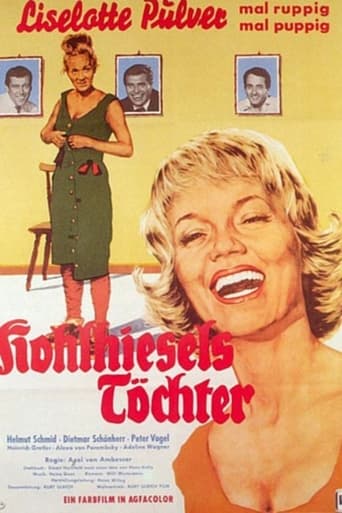Horst in Translation ([email protected])
"Kohlhiesels Töchter" is a West German movie from over 50 years ago and it runs for slightly over 90 minutes. The director is Axel von Ambesser and the writer is Eckart Hachfeld, who adapted Hanns Kräly's idea here. Kräly is the one who writer the 1920 Ernst Lubitsch movie with the same name. That one there had neither color nor sound, so over 40 years later they gave the story a new modern touch. And the epitome (apart from the technical aspects) of this modern touch is Liselotte Pulver. It certainly shows that the early 1960s may have been the best years of her career as shortly afterward, she received a Golden Globe nomination, her biggest success awards-wise. I think that she played her part well here with two very different characters. It was definitely a challenger and the outcome was that she was easily the most positive aspects (actually one of not too many positive aspects) that this film has to offer. Sadly, beyond her performance, there is nothing too memorable here. Especially, the script offers some fairly cringeworthy plays on words ("bedient"? just one example) that you will probably only understand if you are very fluent in German, preferably a native speaker. And the male characters looked and acted like taken out of any random movie made in Germany during that era that focuses on romance and Heimat. As a whole, apart from Pulver, who is still alive today, this was not a good watch and taking everything into consideration I have to give it a thumbs down. Not recommended.
t_atzmueller
German comedies from the 1950's and 1960's aren't so different from Bollywood movies – or American comedies from the same era: harmless, family-friendly humor, an inevitable love story, plenty of cheap, catchy music and insights into the human psyche that goes no deeper than a snake's shadow. Often enough, the German products would emulate their US-counterparts to the point where even the actors would look vaguely similar. In this case, Liselotte Pulver and Dietmar Schönherr were virtual clones of Julie Andrews and Jack Lemmon. It's everything you would expect from a Bob Hope-slash-Doris Day-like comedy – but with a touch of the (in this case Swiss) Alps. Pulver plays the student Liesel who, disillusioned by the life in the big city, returns home to her native Swiss hamlet Hinterflu. On her tail is the Gigolo-like Guenther (Schönherr), who has instantly fallen in love with Liesel and who takes a job as aid at the farm-turned-tourist resort of Liesel's father. Guenthers main obstacles are Liesel's current boyfriend Tony (Helmut Schmid), the opportunistic Rolf (Peter Vogel), who wants to get his hands on the property and mainly Liesel's twin-sister Susi (also Pulver), a nightmare of a woman; ill-mouthed and ugly as the night itself. Liesel's father (Heinrich Gretler) has worries of his own: according to his late wife's will, Susi must marry before Liesel, which, considering Susis looks and demeanor, seems an impossible feat. As mentioned, this is as family-friendly as it gets. Pulver is fantastic in her double role; at times it is hard to believe that the lovely Liesel and boorish Susi are played by the same person. Schönherr comes across like a Jack Lemmon in his freshest days. Tragic actor Vogel (beloved by Austrians for his roles in the TV-series "Kottan Ermittelt"; the actor committed suicide in 1978) plays a character that is slimy and sympathetic at the same time, and Schmid milks his role as the loutish yet cunning and strangely charming farm-aid. In other words: it's a movie of likable characters. Compared to many "stiff" German comedies of the time, this film seems much more generic, well-spirited than many other contemporary works, relying on the characters rather than flat slapstick-humour (especially in comparison to the "Wirtshaus im Spessart"-movies, which likewise star Pulver); a perfect film to pick up one's spirit on a rainy afternoon. Like other reviewers, I'm slightly flabbergasted by the low rating and do, what I rarely do: I give the movie a straight 10 (if those kinds of films are your cup of tea, that is).
jilka
Admittedly, most typical German-language comedies or romances from the 50s or early 60s are rather unrealistic, kitschy and just plain dumb. This one is different though. Yes, it is just a straightforward comedy that won't give you insights into the depths of human behavior or the course of the world, but it does have a smart plot idea, fantastic comical acting from the great Liselotte Pulver, Helmut Schmid (her real-life husband I believe), Dietmar Schönherr and Peter Vogel (deliciously slimy), and also several quite witty puns and linguistic jokes. Even the 3 or 4 songs - which usually are just horrible in German-language films from this period - have a certain self-irony that makes them bearable. As I am writing this the film has received an average rating of only 5.1 (29 votes). I think it is vastly underrated, so I'm giving it a 10 ...
PlanecrazyIkarus
This is quite a well-known concept: A father has two daughters, one charming, one rough. But he won't allow the charming daughter to marry unless the rough one marries, too. So they clean up and educate the rough daughter to be just as charming as the other one...Fairly enjoyable family movie. Not great (Wirtshaus and Spukschloss im Spessart movies are much funnier), but a nice Sunday morning entertainment.



